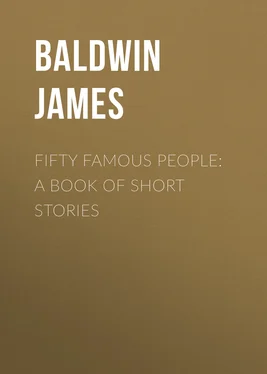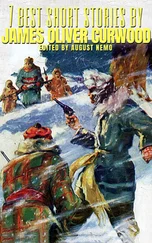James Baldwin - Fifty Famous People - A Book of Short Stories
Здесь есть возможность читать онлайн «James Baldwin - Fifty Famous People - A Book of Short Stories» — ознакомительный отрывок электронной книги совершенно бесплатно, а после прочтения отрывка купить полную версию. В некоторых случаях можно слушать аудио, скачать через торрент в формате fb2 и присутствует краткое содержание. Жанр: foreign_children, foreign_antique, foreign_prose, на английском языке. Описание произведения, (предисловие) а так же отзывы посетителей доступны на портале библиотеки ЛибКат.
- Название:Fifty Famous People: A Book of Short Stories
- Автор:
- Жанр:
- Год:неизвестен
- ISBN:нет данных
- Рейтинг книги:5 / 5. Голосов: 1
-
Избранное:Добавить в избранное
- Отзывы:
-
Ваша оценка:
- 100
- 1
- 2
- 3
- 4
- 5
Fifty Famous People: A Book of Short Stories: краткое содержание, описание и аннотация
Предлагаем к чтению аннотацию, описание, краткое содержание или предисловие (зависит от того, что написал сам автор книги «Fifty Famous People: A Book of Short Stories»). Если вы не нашли необходимую информацию о книге — напишите в комментариях, мы постараемся отыскать её.
Fifty Famous People: A Book of Short Stories — читать онлайн ознакомительный отрывок
Ниже представлен текст книги, разбитый по страницам. Система сохранения места последней прочитанной страницы, позволяет с удобством читать онлайн бесплатно книгу «Fifty Famous People: A Book of Short Stories», без необходимости каждый раз заново искать на чём Вы остановились. Поставьте закладку, и сможете в любой момент перейти на страницу, на которой закончили чтение.
Интервал:
Закладка:
The shepherd led them gently back to the hut and gave them their usual supper of bread and milk. He said nothing to them, but wondered where they had heard the strange word "becos," and what was its meaning.
After that, whenever the children were hungry, they cried out, "Becos! becos! becos!" till the shepherd gave them something to eat.
Some time later, the shepherd went to the city and told the king that the children had learned to speak one word, but how or from whom, he did not know.
"What is that word?" asked the king.
"Becos."
Then the king called one of the wisest scholars in Egypt and asked him what the word meant.
"Becos," said the wise man, "is a Phrygian [Footnote: Phrygian ( pro . frij'i an).] word, and it means bread ."
"Then what shall we understand by these children being able to speak a Phrygian word which they have never heard from other lips?" asked the king.
"We are to understand that the Phrygian language was the first of all languages," was the answer. "These children are learning it just as the first people who lived on the earth learned it in the beginning."
"Therefore," said the king, "must we conclude that the Phrygians were the first and oldest of all the nations?"
"Certainly," answered the wise man.
And from that time the Egyptians always spoke of the Phrygians as being of an older race than themselves.
This was an odd way of proving something, for, as every one can readily see, it proved nothing.
A LESSON IN HUMILITY
One day the caliph, Haroun-al-Raschid, [Footnote: Haroun-al-Raschid ( pro. ha roon' al rash'id).] made a great feast. The feast was held in the grandest room of the palace. The walls and ceiling glittered with gold and precious gems. The table was decorated with rare and beautiful plants and flowers.
All the noblest men of Persia [Footnote: Per'sia.] and Arabia [Footnote: A ra'bi a.] were there. Many wise men and poets and musicians had also been invited.
In the midst of the feast the caliph called upon the poet, Abul Atayah, [Footnote: A'bul Ata'yah.] and said, "O prince of verse makers, show us thy skill. Describe in verse this glad and glorious feast."
The poet rose and began: "Live, O caliph and enjoy thyself in the shelter of thy lofty palace."
"That is a good beginning," said Raschid. "Let us hear the rest." The poet went on: "May each morning bring thee some new joy. May each evening see that all thy wishes have been performed."
"Good! good!" said the caliph, "Go on."
The poet bowed his head and obeyed: "But when the hour of death comes, O my caliph, then alas! thou wilt learn that all thy delights were but a shadow."
The caliph's eyes were filled with tears. Emotion choked him. He covered his face and wept.
Then one of the officers, who was sitting near the poet, cried out: "Stop! The caliph wished you to amuse him with pleasant thoughts, and you have filled his mind with melancholy."
"Let the poet alone," said Raschid. "He has seen me in my blindness, and is trying to open my eyes."
Haroun-al-Raschid (Aaron the Just) was the greatest of all the caliphs of Bagdad. In a wonderful book, called "The Arabian Nights," there are many interesting stories about him.
THE MIDNIGHT RIDE
Listen, my children, and you shall hear
Of the midnight ride of Paul Revere.
The midnight ride of Paul Revere happened a long time ago when this country was ruled by the king of England.
There were thousands of English soldiers in Boston. The king had sent them there to make the people obey his unjust laws. These soldiers guarded the streets of the town; they would not let any one go out or come in without their leave.
The people did not like this. They said, "We have a right to be free men, but the king treats us as slaves. He makes us pay taxes and gives us nothing in return. He sends soldiers among us to take away our liberty."
The whole country was stirred up. Brave men left their homes and hurried toward Boston.
They said, "We do not wish to fight against the king, but we are free men, and he must not send soldiers to oppress us. If the people of Boston must fight for their liberty, we will help them." These men were not afraid of the king's soldiers. Some of them camped in Charlestown, [Footnote: Charles'town.] a village near Boston. From the hills of Charlestown they could watch and see what the king's soldiers were doing.
They wished to be ready to defend themselves, if the soldiers should try to do them harm. For this reason they had bought some powder and stored it at Concord,[Footnote: Concord ( pro . kong'krd).] nearly twenty miles away.
When the king's soldiers heard about this powder, they made up their minds to go out and get it for themselves.
Among the watchers at Charlestown was a brave young man named Paul Revere. He was ready to serve his country in any way that he could.
One day a friend of his who lived in Boston came to see him. He came very quietly and secretly, to escape the soldiers.
"I have something to tell you," he said. "Some of the king's soldiers are going to Concord to get the powder that is there. They are getting ready to start this very night."
"Indeed!" said Paul Revere. "They shall get no powder, if I can help it. I will stir up all the farmers between here and Concord, and those fellows will have a hot time of it. But you must help me."
"I will do all that I can," said his friend.
"Well, then," said Paul Revere, "you must go back to Boston and watch. Watch, and as soon as the soldiers are ready to start, hang a lantern in the tower of the old North Church. If they are to cross the river, hang two. I will be here, ready. As soon as I see the light, I will mount my horse and ride out to give the alarm."
And so it was done.
When night came, Paul Revere was at the riverside with his horse. He looked over toward Boston. He knew where the old North Church stood, but he could not see much in the darkness.
Hour after hour he stood and watched. The town seemed very still; but now and then he could hear the beating of a drum or the shouting of some soldier.
The moon rose, and by its light he could see the dim form of the church tower, far away. He heard the clock strike ten. He waited and watched.
The clock struck eleven. He was beginning to feel tired. Perhaps the soldiers had given up their plan.
He walked up and down the river bank, leading his horse behind him; but he kept his eyes turned always toward the dim, dark spot which he knew was the old North Church.
All at once a light flashed out from the tower. "Ah! there it is!" he cried. The soldiers had started.
He spoke to his horse. He put his foot in the stirrup. He was ready to mount.
Then another light flashed clear and bright by the side of the first one. The soldiers would cross the river.
Paul Revere sprang into the saddle. Like a bird let loose, his horse leaped forward. Away they went.
Away they went through the village street and out upon the country road. "Up! up!" shouted Paul Revere. "The soldiers are coming! Up! up! and defend yourselves!"
The cry awoke the farmers; they sprang from their beds and looked out. They could not see the speeding horse, but they heard the clatter of its hoofs far down the road, and they understood the cry, "Up! up! and defend yourselves!"
"It is the alarm! The redcoats are coming," they said to each other. Then they took their guns, their axes, anything they could find, and hurried out.
So, through the night, Paul Revere rode toward Concord. At every farmhouse and every village he repeated his call.
The alarm quickly spread. Guns were fired. Bells were rung. The people for miles around were roused as though a fire were raging.
Читать дальшеИнтервал:
Закладка:
Похожие книги на «Fifty Famous People: A Book of Short Stories»
Представляем Вашему вниманию похожие книги на «Fifty Famous People: A Book of Short Stories» списком для выбора. Мы отобрали схожую по названию и смыслу литературу в надежде предоставить читателям больше вариантов отыскать новые, интересные, ещё непрочитанные произведения.
Обсуждение, отзывы о книге «Fifty Famous People: A Book of Short Stories» и просто собственные мнения читателей. Оставьте ваши комментарии, напишите, что Вы думаете о произведении, его смысле или главных героях. Укажите что конкретно понравилось, а что нет, и почему Вы так считаете.












